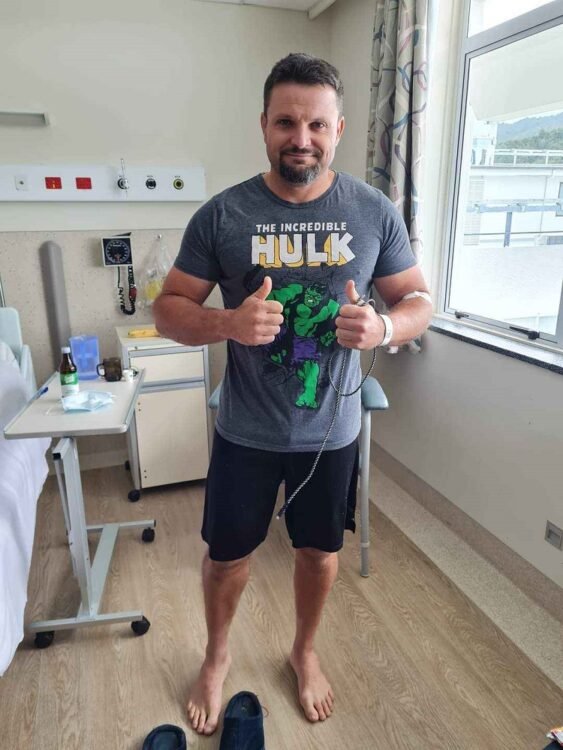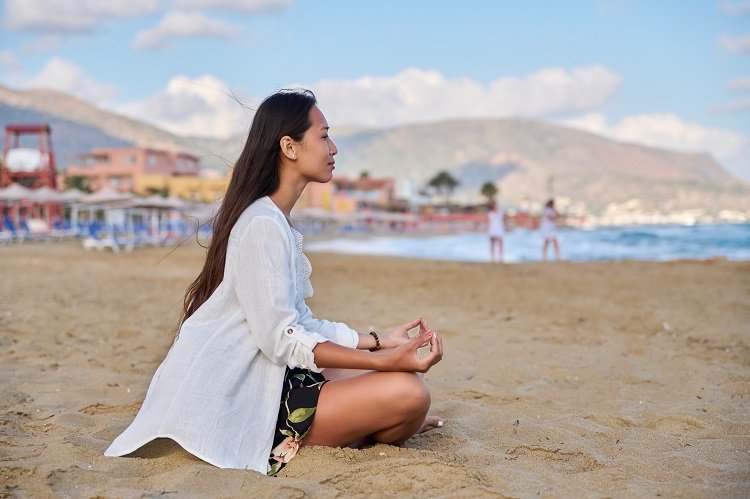On May 18, 2022, a couple of weeks before my 43rd birthday, I suffered a heart attack (HA), followed by my father’s death. This radically altered my life and perspective on many things. Here are a few reflections on what I’ve learned about health and illness in the past few months.
I’ve always had what Carol Dweck calls a “growth mindset” [1] – the belief that abilities can be developed, which fosters a passion for learning and the tenacity necessary for great accomplishment.
This also means that people with a growth mindset typically view failure as an opportunity to learn and improve instead of a reflection of their abilities or a justification for their failures.
Consequently, I used to believe that taking personal responsibility for one’s life is the ultimate virtue that distinguishes people, determines their outcomes, and ultimately determines the quality of our lives.
Taking personal responsibility to create a certain quality of life, whether we are discussing financial success, relationships, parenting, spirituality, health, or anything else, is entirely up to you.
In that regard, I used to embody the philosophy of Epictetus, the great Stoic philosopher, who said, “First say to yourself what you would be, and then do what you have to do.” [2]
The Stoics believed in employing reason and logic to deal with life.
They believed in exercising self-control, coexisting with others, and making reasonable decisions.
That was and still somewhat is my language.
However, still having a heart attack despite being in your early 40s, fit and “healthy,” and doing everything “right” according to your doctor, such as getting regular checkups, not smoking or drinking, avoiding red meat, and exercising, tends to make you question many things no matter your philosophy.

One such question arose from an article by Robert Crawford (2006) [3] in my Massey 175739 Health Psychology: Understanding Health and Illness course, in which he discusses the topic of control.
Crawford discusses the fantasy of individual control in Western culture, where the importance of the self has been and continues to be emphasised. But as my HA has taught me, the problem with the notion of an “all-important self” is the idea of control.
Fundamentally, control is a critical component of individual responsibility. But it is a delusion when it comes to life and health because we have far less control over life than we think.
I believe this has always been the case; we’ve simply become too ignorant (or deluded) in modern times to recognise it.
The ancient people revered the “gods,” i.e., the forces beyond human control that held their lives in their hands. They have always believed the world operates in this manner, subject to forces beyond their control.

But once we placed the “Self” on the throne, most likely during the Enlightenment, we began to believe our own delusion – the notion that we are in control.
However, in line with Crawford’s (2006) discussion of control, it is much wiser to constantly ask ourselves:
- How much do we have control over our own lives?
- How much are our lives determined by external forces?
- How many options do we truly have in life?
- Are we genuinely free to do as we please?
- What role does fate or destiny play in our lives?
- How much can we actually change?
What my HA has taught me, and what Crawford’s (2006) article reinforced, is that in an ever-changing and complex world (e.g., technology, significant financial crises, pandemics, etc.), it is challenging to rely solely on personal accountability to create a high quality of life, with good health (for example).
In truth, I’ve come to see that many individuals mistakenly believe they have complete control over their lives, as I did! (Note: one could probably also argue that some individuals have more control than they think).
This illusion of personal control is the belief that we have complete control over our lives and implies full control over our well-being and health.
In reality, our health, like our lives, is influenced by various uncontrollable factors.
The ancient people understood this.

To begin with, there is the issue of defining health and illness.
What is it, in essence?
On what or who do we base our understanding and approach to health and disease prevention?
For instance, is health merely the absence of disease?
Or is there something more?
Is it a proactive strategy for attaining a longer and more fulfilling life?
Or is it a reactive response that only becomes important when our body “fails” us, as in the case of a HA?
How much does the past influence our conception of health and our pursuit of wellness?
Because a world in which health and illness are understood solely from a traditional biomedical perspective (health and disease as being caused by physical or biological factors) will undoubtedly differ from a world in which health and illness are understood as socially constructed.
Even so, I believe neither is exhaustive on its own because they both contain portions of the same truth.
Moreover, to what extent does culture or contemporary culture influence our social constructs and thus understanding and pursuit of health and ideal quality of life?
I mean, culture does influence our understanding of health and illness, right?!
For instance, it may impact how we interpret and define our conceptions of health and illness and how we seek well-being as a direct result of that.
Some cultures may define health as physical well-being, while others may include mental and spiritual well-being.
Regardless, that will influence how individuals approach their health and the health of others, as well as how they seek to maintain or enhance their well-being and what sources they use.

Some may explore a variety of sources, such as alternative methods, like the power of prayer or acupuncture, whilst other individuals may opt to only seek traditional medical advice from physicians.
Significantly, the latter is also frequently influenced by our cultural beliefs and values, which shape our understanding of and response to illness.
For example, some cultures may view illness as a punishment from God or a sign of weakness, so prayer makes sense, whereas others may view it as an opportunity for growth or a normal part of life.
In the same breath, culture also influences our priorities and approaches to well-being. Some cultures may place a premium on individual achievement and success, whereas others may place a greater emphasis on community and relationships.
All of the above will ultimately affect how people manage their lives and what they consider essential.

But what about forces that (potentially) transcend our cultures?
How do the societies in which we reside, for example, influence, or even dictate, our wellbeing of health, illness, and well-being?
Is the pursuit of health and illness the sole responsibility of the individual, or is there more to say about the connection between individual health and community well-being?
Or does it depend solely on whose viewpoint we adopt or whose viewpoint is promoted more like, for example, in research?
Whom do we listen to when it comes to taking advice? And do they not have their own agendas?
Consequently, an even larger question arises: to what extent does the media contribute to or influence all of the above?
That is an important question because the media (including social media) is influential, and people are susceptible to influence.
Psychologically speaking, despite all the noise we make, we are highly susceptible to propaganda and politics of the day.
For example, the illusory truth effect, also known as the illusion of truth, is a concept from the field of psychology that describes how we can be led to believe false information through exposure to it on a repeated basis (cf. Illusory truth effect – The DecisionLab.com)
What makes this scary is that in the era of social media, it is extremely easy for false information to spread rapidly to millions and millions of people, which poses a severe problem.
According to TheDecisionLab.com, some evidence suggests that online propaganda campaigns have already significantly impacted global politics. These campaigns are often run by corrupt or agenda-driven individuals who understand that repetition is all it takes for a lie to gain momentum. The rise of conspiracy theories during the pandemic is a case and point (c.f., Kużelewska & Tomaszuk, 2022) [4].

Although that might sound overdramatic, the risk is real and does pose a serious danger to the fabric of our societies and the foundations of democracy.
It is more important than ever to evaluate the quality of the information we consume because not everything that gains widespread attention or inspires passionate demonstrations is founded in fact.
When it comes to health and illness, the modern media can be seen to push their own agendas through a variety of means, including:
- Spreading the stigma of certain conditions, for example, mental health (c.f., How the Stigma of Mental Health Is Spread by Mass Media, verywellmind.com).
- Focusing on rare and sensationalistic cases of illness rather than presenting a more accurate picture of the prevalence and severity of different health conditions. This can create a distorted view of how common and dangerous certain illnesses are.
- Promoting miracle cures and quick-fix solutions to health problems without providing accurate information about these treatments’ risks and potential side effects.
- Pushing particular agendas, such as those relating to diet, exercise, or vaccination, without presenting a balanced view of the evidence.
- Making unsubstantiated claims about the health benefits of specific products or behaviours (e.g., the known myth of using Vitamin C to treat colds).
- Failing to disclose conflicts of interest, such as when media outlets are owned by or receive funding from companies that profit from positive product coverage.
The point is, when it comes to health advice (or any advice, for that matter) in the media or online, what we see is not always what we get, nor is it always beneficial to our health.

Along with these factors, social determinants also impact how much control we have over our health.
The social determinants of health that are most prevalent but also frequently disregarded are things like income, education, employment, housing, gender, and social support.
According to researchers (cf. Lyons & Chamberlain, 2006) [5], these factors can affect our health in various ways, from determining whether we have access to adequate healthcare to affecting our mental and emotional health.
For example, some researchers identified a correlation between a high incidence of cardiovascular risk factors and education and employment levels. [6]
This brings us back to the vital question of personal responsibility and control, for example: How does a person in rural India living from hand to mouth “take control” of their health and life compared to a singleton woman in a major U.S. city with access to gyms and healthy food?
The reality is it is not a level playing field.

In addition to all those powerful forces that affect our ability to exercise personal responsibility, genetics is one that I have come to appreciate as central to health and illness.
Now, I understand that in a conversation about social factors and health and disease, there might sometimes be little room for considering genetics or much room for debate.
Some may avoid considering genetics out of fear of being perceived as siding with a biomedical perspective. Some others may outright contend that our genes are a significant factor in determining our health and that we should consider them when making decisions regarding our health.
Others might argue that our genes are less significant than our lifestyle choices (i.e., health pursuits) and that we should prioritise making healthy decisions regardless of our genetic makeup.
Yet, another group may contend that our social context does not necessarily influence our genetic makeup but rather our genetic expression. For instance, the food we consume, the air we breathe, and the water we drink can all contain chemicals that could affect gene expression.
But, the point is, irrespective of which camp you’re in when considering genetics and health, a HA has taught me that my body has something to say about my health, whether I agree with traditional BMI categories, cholesterol parameters set by Western science, or daily recommended saturated fat intake or not.
Moreover, whether it’s social factors or genetics, once again, the point is made that control is illusory.
Yes, we can exert some influence, but we are not in complete control, especially regarding our health. But more than that, not everyone is in the same position to exert equal influence.
That doesn’t mean you can’t rise above your constraints or limitations and make the best of what you’ve been dealt with, but it does suggest that we should be more tolerant and understanding of ourselves and others before passing judgement.
Having a heart attack at a young age has made me think a lot about health and illness over the last few months, and it has made me very grateful for life.
And the 175739 Health Psychology: Understanding Health and Illness course at Massey has made me appreciate my privileges, culture, environment, and health system much more than I did before.
Understanding the interconnected nature of health and illness, as well as the limits of human agency in a dynamic and complex world, has been an eye-opening experience for me.
I realised again that if anything, it should make us more humble and grateful when things are going well for us, and more caring when things are not going well for others.
Sadly, as Crawford (2006) notes, even though there is a multitude of influential forces beyond our control, “the fantasy of individual control will not likely be significantly disturbed in a culture in which the self is held to be sovereign” (p. 417).
>>>>>>>
[1] Dweck, C. (2007). Mindset: The New Psychology of Success. Random House.
[2] Epictetus, Torode, S. (translator), Wentworth Higginson, T. (translator). (2017): The Manual: A Philosopher’s Guide to Life. Ancient Renewal.
[3] Crawford, R. (2006). Health as a meaningful social practice. Health, 10(4), 401-420.
[4] Kużelewska, E., Tomaszuk, M. Rise of Conspiracy Theories in the Pandemic Times. Int J Semiot Law (2022). https://doi.org/10.1007/s11196-022-09910-9
[5] Lyons, A. C., & Chamberlain, K. (2006). Health psychology: A critical introduction. Cambridge University Press.
[6] Palomo, L., Felix-Redondo, F.-J., Lozano-Mera, L., Perez-Castan, J.-F., Fernandez-Berges, D., & Buitrago, F. (2014). Cardiovascular risk factors, lifestyle, and social determinants: A cross-sectional population study. BRITISH JOURNAL OF GENERAL PRACTICE, 64(627), E627-E633. https://doi.org/10.3399/bjgp14X681793
